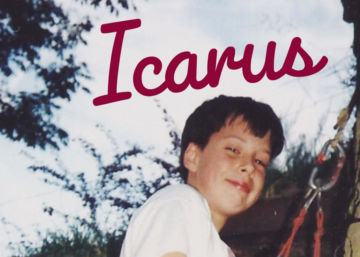
She started from zero in Hong Kong. No one said it was easy. In a public housing residential area next to the main road, she marked a space for work. Scissors, razors, shavers, mirrors, combs she lay on a folding table. Noisy vehicles and strong sunlight never stopped her. Cutting each person’s hair, she earned $25.
She had to carry a heavy instrument box on the way to work. She worked from morning to night. A lamp was with her at night. The better she did, the higher the risk. In Hong Kong, it was not allowed to make a living in this way. My mother needed to stay alert, like other unlicensed hawkers who ran away from government officers (of the Food and Environmental Hygiene Department).
Time went by. More and more people knew my mother’s name. Maybe some clients loved economical and quick haircuts, or the service my mother provides was really good for them. She mentioned ‘three old men’. They marked their own working spaces nearby. They were always upset about her earning more than they did.
One time, she was spotted. The officer caught my mother, with his arms stressing her waist. She kept struggling. Her stomach started to bleed from the chaos. After this, and days of being hospitalized, she moved away.
If a writer cannot lose pens and paper, a barber cannot lose scissors and mirrors. My mother, 54 years old, has dedicated her life to people’s hair. I am 22 years old now, and she has cut hair for at least 22 years, as far as I know.
She comes home bringing a new pile of combs, scissors, and razors. She arranges them one by one on the table as if selling them at a flea market. She tells me they are not the same. ‘This comb has wider teeth than that one. This pair of scissors has a slightly different edge from that one. This shaver has a smaller inch of the blade…’. She buys these in bulk as if she is sure that they will be used up one day.
My mother has had three stages. She has been running a barber shop in San Po Kong Plaza, Wong Tai Sin District, in the recent decade. Before she married my father, she had two barber shops in Guangdong, China. Since she came to Hong Kong in 1997, she’s been an unnamed barber on the street.
It is a long story. My grandparents were not well off. My mother was less educated so her younger sister could study more. My mother tells me, ‘I go onto streets and look at how the barbers work.’ It comes as a shocking history to me. I ask, ‘So you really haven’t gone to any technical schools for this?’ She says, ‘No. Learn it by seeing.’ I cannot believe she learned to be a barber without a master. She is actually far more hard-working and talented than I used to imagine. I feel a sense of destiny—whether my mother chooses to be a barber, or is chosen.
As an elementary school kid, I was not very happy. To be honest, I felt ashamed because I thought she was doing something unpleasant. When my classmates asked about my mother’s profession, I would rather answer ‘she’s a housewife’. If I hid the truth, no one would judge my family.
She dresses in a red apron and wears a mask. She arranges a row of chairs outside the shop’s window wall for people waiting. Every time a person walks by, she asks amicably, ‘Want a haircut?’ Some people will slow down and look at her fingers clawing the scissors before they go. Some will nod and wait for a haircut. My mother greets everybody well.
She has settled now in a safe place. Her scissors are so well-treated here they all dance arrogantly in front of the mirror. Her barber shop’s opening was such a remarkable moment. The beautiful flower basket stands she received, saying ‘Congratulations!’ The fluorescent lamp overhead, a spotlight on my mother’s spirit.
She often uses the cargo lift because she is too early to arrive and too late to leave. The main entrance of the plaza is locked. At night, she sweeps the floor, cleans stuff, and sees the earnings. If a client drops by at this moment, her door will still stay open. She is okay to tidy things up again but she is not fine with letting her clients down.
She needs me to examine her hands. All ten fingers have been hurt by numerous terrible hair splinters. She cannot bear them but cannot deal with it on her own. The hair splinter is really tiny but big enough to make the skin swollen and red. I have to look very closely and touch the affected area very softly. This is an urgent treatment, operated with a nail clipper, a needle, and tweezers. A needle cuts into her skin and it starts to bleed. She yells with pain. I stop. She asks me to keep going. A hair splinter makes her unable to hold scissors properly. If we do not fix it tonight, tomorrow is a harder day.
Nowadays, haircutting service becomes a money-making business. ‘We do not provide services such as shampooing, blowing, shaving, perming, coloring and so on. We believe our customers can manage all these by themselves. We aim to provide our specialized service: haircutting with trimming service of sideburns or nape. We will use our vacuum hair clipper to clean the cut hair on your neck and shoulders. The whole process takes 10-15 minutes only. The efficient haircutting service will be carried out by our well-trained professional stylists,’ says the QB HOUSE’s website. It shows how they draw the selling points and make the branches ubiquitous in the city.
Ten years ago, a sheer haircutting service was not something mainstream in Hong Kong. Different from those Shanghai-style barber shops that are usually found around the corner of Shanghai Street or Java Road. It is even not about those hair salons, like Kim Robinson or Alchemy, that have a foothold in Central. While I have not yet managed to articulate all these things, my mother has been persevering and there have been people appreciating her. She maintains $30 per head, for which grassroots people are grateful. This ‘more-pay-for-more-work’ attitude and down-to-earth virtue have raised me.
My mother was pioneering ten years ago. She opened the first one-man barber shop in San Po Kong Plaza. While the plaza has an ever-changing landscape, where many shops move in and out year by year, her shop has stayed. She stays simple and practical. With more one-man salons growing, competitions are fierce and sustaining the business is harder. Yet, the sunrise and sunset of your barber shop are never determined by how many advertisements, right? ‘You have poured your blood, sweat, and tears into it. People will see and stay with you.’ She visits homes of the immobile elderly people. She offers more than enough but still fears to lose even one of her clients.
She is sensitive and paranoid. ‘He has not visited for a long time…’ ‘There is a woman starting a hair salon on the first floor…’ ‘I seemingly see that lady going out from another barber shop when I am on the way to the toilet. She came to me last time…’ ‘The old man always pays more than enough, I say no but he still…’ ‘Can you help me search for a new rotating light stripes sign online? Mine is getting run down…’ At home, we seldom have a long conversation. She is tired or I am busy. When she speaks up, I will hear some anecdotes in her barber shop. I am not sure whether it is good or bad. But I do know that she is such a talkative person at work. Spending time chit-chatting with clients is her daily leisure. A new restaurant, a car accident, a great discount. She does not read newspapers or browsed the Internet. Face-to-face conversations keep her absorbing information about the outside world. Like last week, when a client told her a health supplement was good, she purchased one bottle that night.
I do not understand something—Why is she always working—Why is she lenient with people coming for haircuts at the time she is supposed to go—Why she does she get no time to finish her lunchbox with salted fish and steamed pork and stay hungry all day long—Why doesn’t she listen and change, when I tell her not to do this to the body—Why does she earn money but not spend money—Why does she work like a machine—Why doesn’t she know to enjoy a life—Why can she remember names of her clients but forget the names of my class teachers—Why as the boss cannot she reschedule for my school’s Parents’ Day or Picnic Day—Why can’t she leave her scissors but she can leave her kids—Why does she always see her clients before me?
I remember she dyed my grandmother’s hair in black at home. And I remember how nervous I was when she was going to cut my dear fringe. Now, I am rest assured of his kind of intimacy between us, when my mother takes care of my hair, eyebrow, and mustache. I remember one recent midnight, when I noticed she was combing out her hair in the bathroom. I questioned what she was doing. ‘Dyeing hair,’ she said. I looked up and found some white hair growing there unwittingly.
Her eyes are getting weakened as she is aging. Even so, she does not forget the faces of her clients. She tells me she has witnessed the little kids growing up into young boys and girls, like Isaac, and the old people becoming older. She knows how to soothe a baby’s anxiousness when cutting the softest hair. She remembers what hairstyles her clients need, such as a buzz cut, an undercut, or making the hair thinned. She will take out her best tool. For a man’s buzz cut, she uses the electric shaver on his hair and the razor on his sideburn and beard. For making a woman’s hair layered, she takes out the hair clip and cuts her hair by sections.
Back home, she falls asleep in the midst of watching television, like Secret of the Heart (1998), on the chair. I wake her up and ask her to sleep on the bed. She crawls into our thermal massage bed at the living room and snores in a minute. A while later, I wake her up again and tell her either take a shower or sleep in her bedroom.












